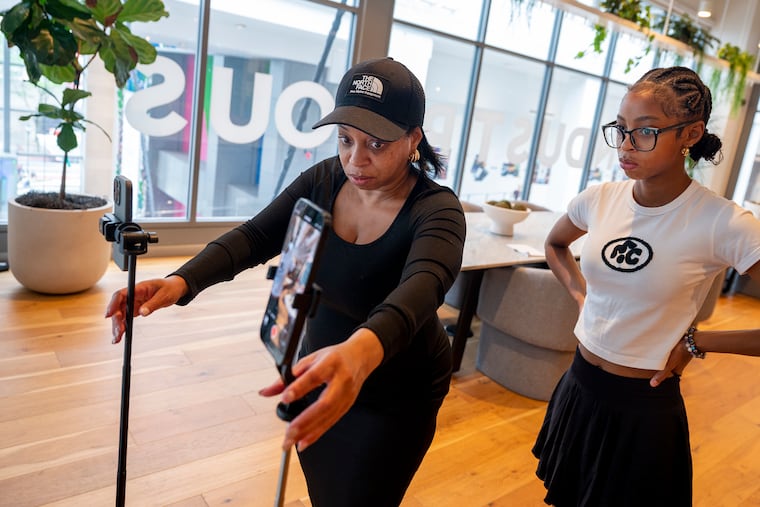Philly’s unaesthetic moms show messy cars, ‘regular’ kitchens and real life on social media
As highly curated content dominates Instagram and TikTok, a new trend of 'unaesthetic' moms is gaining traction by showcasing the unfiltered reality of parenting.

Scroll through social media for too long and you might start to believe that everyone, tired moms included, wakes up with hot lemon water, follows a 10-step skin care routine, makes a beautiful breakfast and healthy lunch for their children in a spotless home, works out, and journals — all before those children wake up for the day.
Gloria Ross, a Philadelphia mom of three who posts content online as Mom Manager Glow, wasn’t buying it.
“I’m not setting up the camera, walking back into my bedroom, and pretending to wake up,” she deadpans. “I’m not doing none of that.”
Ross, 51, calls herself an “unaesthethic mom,” part of an online trend of unpolished, realistic content about parenting and domestic life. It’s an antidote to the influx of highly curated content on Instagram and TikTok, often tagged with “aesthetic home decor” or “aesthetic lifestyle.”
These videos might show a mother making peanut butter-and-jelly sandwiches from scratch, including baking the bread, or showing off their perfectly designed, neutral-toned nursery.
In contrast, Ross’ videos, usually titled “A Day in the Life of a Philly Mom,” follow along as she picks her daughter up from school, goes shopping for a new outfit, or packs a suitcase on the floor while her daughter snacks on ramen noodles.
“There is a turn in what people are engaging with now,” she says. “Anything that seems inauthentic or that they can’t relate to, they’re turning away. People want to be inspired, but not basically lied to.”
Since she started posting her parenting content in November 2023 — her first post was about her daughter’s experience at boarding school at Girard College — she has seen her TikTok account grow from a few hundred to more than 100,000 followers. She has joined the TikTok Creativity Beta Program, which allows users to earn money, and has signed with an influencer agency to handle brand deals.
Brianna Roman, a 29-year-old mother of two from Northeast Philly, gained a following online after posting about her journey as an unemployed single mom. Between gig work and seasonal jobs, her social media spots help pay the bills.
@briannawasthere These stuffed animals have taken over #momlife #momsoftiktok #relatable ♬ Funny - Gold-Tiger
One of her first videos to go viral showed her cleaning out her car.
“My car is definitely unaesthetic,” she says. “It’s all banged up, the ceiling is peeling off, but I’m not ashamed. My car gets me from A to B, it gets me where my kids need to be, and I don’t have a car note.”
“People were saying, ‘Thank you so much for normalizing this, it’s so hard to find a job that works with kids schedules,’ and, ‘Thank you for normalizing saving money,’” she says.
But the unaesthetic-content trend isn’t surpassing or replacing magazine-worthy mom content, says Jo Piazza, a Philadelphia writer who hosts the podcast Under the Influence, about the economy and culture around social media.
“What is old is new again. The original mom blogs in the early days of blogging were about how difficult it was to be a mother and a woman in the world,” Piazza says. With the rise of the very visual mediums of TikTok and Instagram, aspirational content took over.
“I think that women are finally exhausted of those perfect-seeming images that make everyone’s life look like a magazine,” Piazza says. Yet even as more influencers are showing the messy part of their life, accounts featuring those pristine images still go viral more often and get bigger brand deals.
The unaesthetic moms may be less filtered, but they still work hard to create content.
Ross wakes up at around 4 a.m. daily to make sure she responds to every single comment on her videos, even and especially the negative ones. (“They don’t realize they’re boosting my engagement, so I troll them back a little bit,” she says.)
She films hours of footage from her and her daughters’ everyday lives, then edits videos and does voice-overs. A social-media manager by day, she analyzes SEO and engagement on her posts to find the most successful formula.
Roman plans out her posts for the week on Sundays and says she is “chronically on her phone.” She taught herself editing and is now expanding her business to sell digital products like budget planners she designed.
“There is potential for it to be a full-time job, but you really have to treat it like a full-time job,” she says. “You can’t go days without posting.”
For mothers like Jasmine Catledge, a 33-year-old from South Jersey, making relatable parenting content is about the community, not income.
Reeling from postpartum depression after the birth of her daughter, now 3, Catledge found solace in the comment section of her videos, which feature her daughter’s daycare and keeps it real about picking her battles as a mom. (Chicken nuggets for dinner? There are bigger things to worry about.)
“They’re my internet besties,” she says.
“Social media can be very toxic and overwhelming,” she says. “You’re seeing moms doing playdates on a random Wednesday at 10 a.m., and you wonder, ‘Why do I not have that life?’ Everyone should be seen, everyone should have that space. Maybe you’re not married, maybe you don’t have that forever home yet; you should still be able to scroll social media and find your people.”